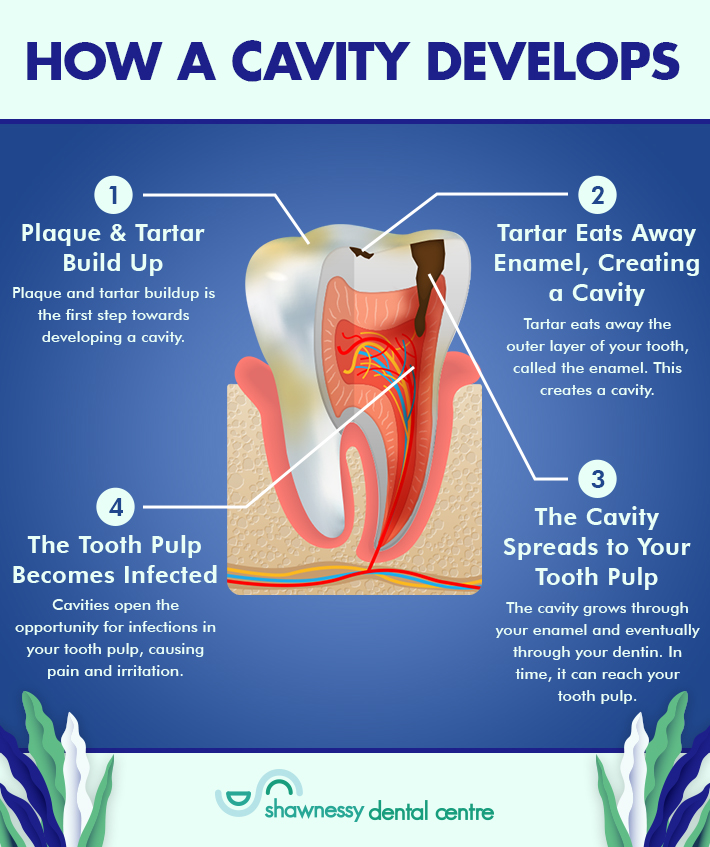Cavities aren’t the first issue to develop when it comes to your teeth, but they can act as a catalyst to other, more severe tooth problems if they’re left untreated. Preventing cavities from developing, or removing them when they do, could help maintain your healthy smile for years. But what are cavities? And what are the steps you need to take to prevent them or even remove them?
Shawnessy Dental Centre is here to answer any and all questions about cavities or your oral health. It’s important to note that even though there are several strategies you can use to protect your teeth from cavities, every person is different, and you should speak to your dentist to learn about which process may be right for you.
Book an appointment with us today if you’re ready to see how our team can serve your oral health.
How Do Cavities Develop?
Cavities, also known as tooth decay, are the culmination of bacteria, plaque, and tarter building on your teeth for a period of time. They commonly develop in young children, but anyone with teeth can develop a cavity.
The risk of developing a cavity increases with a poor oral health routine. Still, the risk can also increase if you consume a lot of sugary foods and drinks, don’t get enough fluoride on your teeth, frequently have dry mouth, or experience heartburn.
Cavities begin as bacteria that subsequently hardens into plaque, eventually hardening into tartar. Tartar wears down the outer layer of your teeth, called the enamel, before attacking your dentin and, soon after, your tooth pulp. Your tooth pulp, which houses nerves and blood vessels, can then swell over time, causing pain and potentially leading to problems with your gums and jaw bone.

Taking Prevention Measures at Home
Cavities are common, but they’re also preventable.
Your first line of defense is a reliable oral health routine. Just by brushing and flossing your teeth twice a day, you can significantly reduce the risk of developing a cavity. However, that isn’t the only strategy.
Some other ways you can help protect your teeth from developing a cavity is by:
Using Fluoride Toothpaste
Fluoride is a naturally occurring mineral known for strengthening your tooth’s enamel and protecting it from the effects of plaque and tartar. It is commonly found in tap water, but you can also find fluoride toothpaste virtually everywhere where toothpaste is sold.
Calgary hasn’t had fluoride in its tap water for several years, but a recent vote on the matter has flipped the decision. Calgarians should expect to see fluoride back in their water by 2023 or 2024.
Avoiding Cavity-Causing Foods
A long list of foods and beverages can increase the risk of developing a cavity. Sugary snacks and drinks are often singled out as a common cavity-causing consumable, but other items can also include sticky, soft foods like dried fruit, toffee, and fruit leather snacks.
Having Regular Dental Exams & Cleanings
While having a great oral health routine is fantastic, there might be only so much you can do to protect your teeth from cavities.
Every dentist agrees that having dental exams and cleanings every 6 months is the best way to prevent cavities from developing or prevent cavities from causing further issues with your oral health.
Our cleanings also include a fluoride treatment to help strengthen your enamel and protect it from future plaque and tartar buildup.
Removing Cavities
If we detect a cavity in your tooth, there are several different ways we can help treat the issue before it leads to other oral health problems.
The treatment we recommend ultimately depends on how far your cavity has progressed. We’ll be more than happy to talk about our treatments when you come in for your regular exam and cleaning.
Fillings
Fillings are common procedures many people have to help remove cavities before it reaches your tooth pulp.
During a filling, your dentist will numb the cavity-affected tooth and the area around it. Then, they’ll remove all traces of the cavity by creating a small hole in your tooth. Your dentist will then fill the space with a material best suited for you (the most common being dental amalgam).
Your dentist will monitor your filling during your regular dental exams to ensure it’s not broken or decaying.
Root Canals
If a cavity has reached your tooth pulp and is causing pain and irritation, you may need a root canal.
Root canals are procedures that remove infected and damaged tooth pulp, which could increase the risk of developing tooth abscesses. During a root canal, your dentist creates an opening in your tooth that will allow them to remove the infected pulp. They’ll then seal the gap with a filling and a crown.
Tooth Extraction
If a cavity has progressed far enough, the only option might be to remove the tooth entirely.
Depending on what may be best for you, your dentist can recommend a partial denture or a dental implant to replace your natural tooth.

Exams & Cleanings Are Key to a Healthy Smile
A great oral health routine, supported with regular dental exams and cleanings, can help protect your teeth from cavities and keep your smile healthy.
If you’re wondering how our team can help serve your oral health, get in touch with our team today to book an appointment.


